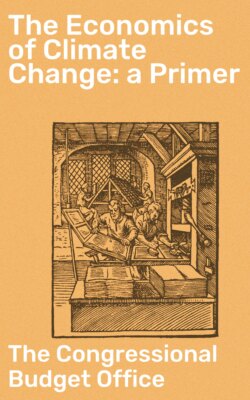Читать книгу The Economics of Climate Change: a Primer - The Congressional Budget Office - Страница 4
На сайте Литреса книга снята с продажи.
Summary and Introduction
ОглавлениеTable of Contents
Human activities—mainly deforestation and the burning of fossil fuels—are releasing large quantities of what are commonly known as greenhouse gases. The accumulation of those gases is changing the composition of the atmosphere and is probably contributing to a gradual warming of the Earth’s climate—the characteristic weather conditions that prevail in various regions of the world. Scientists generally agree that continued population growth and economic development over the next century will result in substantially more greenhouse gas emissions and further warming unless measures are taken to constrain those emissions.
Despite the general consensus that some amount of warming is highly likely, extensive scientific and economic uncertainty makes predicting and evaluating its effects extremely difficult. Because climate is generally a regional phenomenon, the effects of warming would vary by region. Moreover, some effects could be positive and some negative. Some could be relatively minor and some severe in their impact: warming could raise sea levels; expand the potential range of tropical diseases; disrupt agriculture, forestry, and natural ecosystems; and increase the variability and extremes of regional weather. There is also some possibility of unexpected, abrupt shifts in climate. Actual outcomes will probably be somewhere in the middle of the range of possibilities, but the longer that emissions grow unchecked, the larger the effects are likely to be.
A variety of technological options are available to restrain the growth of emissions, including improvements in the efficiency of people’s use of fossil energy, alternative energy technologies such as nuclear or renewable power, methods for removing greenhouse gases from smokestacks, and approaches to sequestering gases in forests, soils, and oceans. But those alternatives are likely to be costly, and they are unlikely to be widely implemented unless measures are taken to lower their price or to raise the price of greenhouse gas emissions.
This Congressional Budget Office (CBO) study presents an overview of the issue of climate change, focusing primarily on its economic aspects. The study draws from many published sources to summarize the current state of climate science. It also provides a conceptual framework for considering climate change as an economic problem, examines public policies and the trade-offs among them, and discusses the potential complications and benefits of international coordination.
